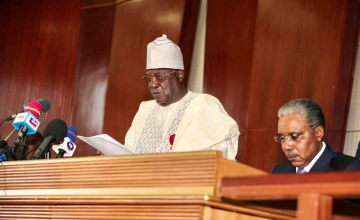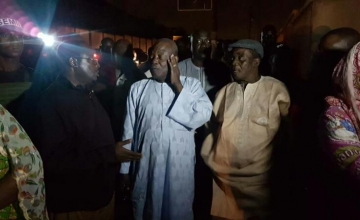_archives_cameroon-info-p-net_800xm9x.jpg)
Members of the Southern Cameroons Civil Society Consortium led by John Mbah Akuroh in a statement on social media dated June 24, 2019 suggests that there are ongoing talks between some leaders of the Southern Cameroons Liberation Council, SLC and some Cameroonian authorities.
“The Consortium has read with keen attention information circulating on social media about talks purportedly going on in Geneva between some leaders of the Southern Cameroons Liberation Council, SCLC and officials of La Republique du Cameroun,” the statement read in part.
The talks are said to be mediated by the Swiss-based Centre for Humanitarian Dialogue.
“John Mbah Akuroh, leader of the Consortium has now stated and clarified the Switzerland talks. In a public video, the Consortium leader says that the current Switzerland talks is not only including members of the SCLC, it has amongst them: President Sisiku Representatives, Dr. Samuel Sako Representatives, SCCOP Representatives, SCAPO Representatives and Leaders and/or Representatives of SCLC [Gorji Dinka’s faction is also present in Geneva],” activist Mark Bareta said in a Facebook post.
Akuroh says the Consortium is backing out of the Geneva talks citing procedural lapses. “The Consortium took exception from participating in the informal talks ongoing at this moment. The boycott is motivated by the Swiss-based Centre for Humanitarian Dialogue’s inability to follow due process. The Consortium shall be involved when all the standard operating procedures relating to such diplomatic talks would have been followed,” read a statement signed by Akuroh, Ndeh Geofred Andang and Mawum Fuh Che.
Soldiers have since engaged armed men fighting for the independence of a country they call Ambazonia – a geographical allusion to Cameroon’s North West and South West Regions. The fighting continues to rage unabatedly despite calls by national and international bodies for an inclusive dialogue to address the root causes of the problem.
Common Law Lawyers in Cameroon went on strike in October 2016 to protest perceived government attempts to annihilate the Common Law practice in a constitutionally bilingual and bi-jural Cameroon. The strike lasted for over a year.
Anglophone teachers in the country joined the strike on November 21, 2016 to uphold Anglo-Saxon values they said were under threat in Cameroon’s two English-speaking regions. Same day, Mancho Bibixy staged a coffin revolution at Liberty Square in Bamenda to protest against the marginalisation and economic deprivation of Anglophones.
Matters came to a head on Thursday, December 8, 2016 when the population of Bamenda took to the streets to denounce the politicisation of a strike action they considered genuine and borne of longstanding grievances.
Days of ghost town and school boycott have since been observed throughout the South West and North West Regions of the country.
On January 17, 2017, Barrister Nkongo Felix Agbor Balla and Dr. Fontem Neba, leaders of the Cameroon Anglophone Civil Society Consortium (CACSC) were arrested moments after the consortium had been banned along with the Southern Cameroons National Council, SCNC.
Sisiku Ayuk Tabe, president of the self-styled state of Ambazonia was arrested in Nigeria on January 5, 2018 along with nine other members of his cabinet including Tassang Wilfred, Nfor Ngala Nfor and Barrister Eyambe Ebai.
“The government crackdown on Anglophone activists has since intensified with arbitrary arrests and detentions, torture and extra-judicial killings becoming the new normal,” human rights groups have said. Government has since denied claims of wrongdoings.
Separatists have also been accused of carrying out kidnappings for ransom, extrajudicial killings, maiming, arson, targeting civilians and even enforcing a school boycott for three years now.
The fate of many remains precarious as security forces battle separatists. President Paul Biya has since called on the armed men to lay down their arms and be reintegrated into society but guns have since taken the place of dialogue and peace.
Barrister Nkongho Felix Agbor Balla, Founder/President of the Centre for Human Rights and Democracy (CHRDA) Buea says over 210 villages have been burnt, hundreds arrested and detained, thousands killed, and about 500,000 persons displaced internally and externally.














